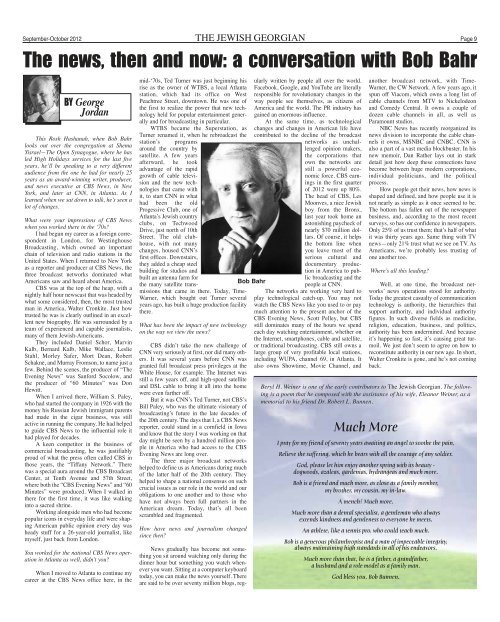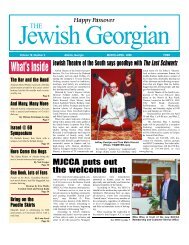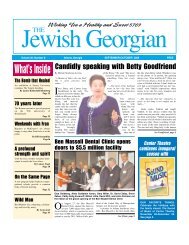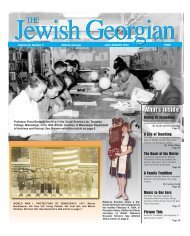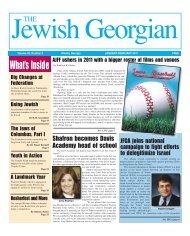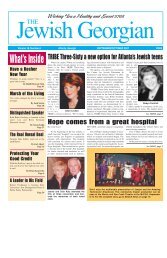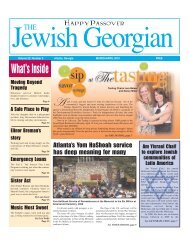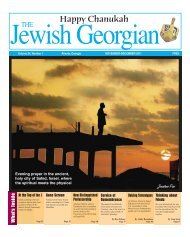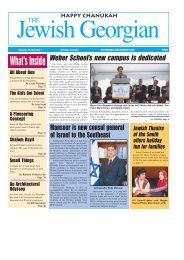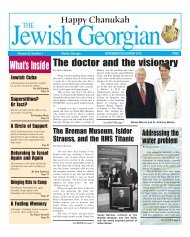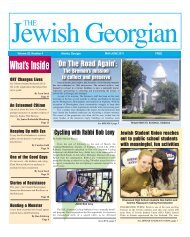mjcca news - The Jewish Georgian
mjcca news - The Jewish Georgian
mjcca news - The Jewish Georgian
Create successful ePaper yourself
Turn your PDF publications into a flip-book with our unique Google optimized e-Paper software.
September-October 2012 THE JEWISH GEORGIAN Page 9<br />
<strong>The</strong> <strong>news</strong>, then and now: a conversation with Bob Bahr<br />
BY<br />
George<br />
Jordan<br />
This Rosh Hashanah, when Bob Bahr<br />
looks out over the congregation at Shema<br />
Yisrael—<strong>The</strong> Open Synagogue, where he has<br />
led High Holidays services for the last five<br />
years, he’ll be speaking to a very different<br />
audience from the one he had for nearly 25<br />
years as an award-winning writer, producer,<br />
and <strong>news</strong> executive at CBS News, in New<br />
York, and later at CNN, in Atlanta. As I<br />
learned when we sat down to talk, he’s seen a<br />
lot of changes.<br />
What were your impressions of CBS News<br />
when you worked there in the ‘70s?<br />
I had begun my career as a foreign correspondent<br />
in London, for Westinghouse<br />
Broadcasting, which owned an important<br />
chain of television and radio stations in the<br />
United States. When I returned to New York<br />
as a reporter and producer at CBS News, the<br />
three broadcast networks dominated what<br />
Americans saw and heard about America.<br />
CBS was at the top of the heap, with a<br />
nightly half hour <strong>news</strong>cast that was headed by<br />
what some considered, then, the most trusted<br />
man in America, Walter Cronkite. Just how<br />
trusted he was is clearly outlined in an excellent<br />
new biography. He was surrounded by a<br />
team of experienced and capable journalists,<br />
many of them <strong>Jewish</strong>-Americans.<br />
<strong>The</strong>y included Daniel Schor, Marvin<br />
Kalb, Bernard Kalb, Mike Wallace, Leslie<br />
Stahl, Morley Safer, Mort Dean, Robert<br />
Schakne, and Murray Fromson, to name just a<br />
few. Behind the scenes, the producer of “<strong>The</strong><br />
Evening News” was Sanford Socolow, and<br />
the producer of “60 Minutes” was Don<br />
Hewitt.<br />
When I arrived there, William S. Paley,<br />
who had started the company in 1926 with the<br />
money his Russian <strong>Jewish</strong> immigrant parents<br />
had made in the cigar business, was still<br />
active in running the company. He had helped<br />
to guide CBS News to the influential role it<br />
had played for decades.<br />
A keen competitor in the business of<br />
commercial broadcasting, he was justifiably<br />
proud of what the press often called CBS in<br />
those years, the “Tiffany Network.” <strong>The</strong>re<br />
was a special aura around the CBS Broadcast<br />
Center, at Tenth Avenue and 57th Street,<br />
where both the “CBS Evening News” and “60<br />
Minutes” were produced. When I walked in<br />
there for the first time, it was like walking<br />
into a sacred shrine.<br />
Working alongside men who had become<br />
popular icons in everyday life and were shaping<br />
American public opinion every day was<br />
heady stuff for a 26-year-old journalist, like<br />
myself, just back from London.<br />
You worked for the national CBS News operation<br />
in Atlanta as well, didn’t you?<br />
When I moved to Atlanta to continue my<br />
career at the CBS News office here, in the<br />
mid-‘70s, Ted Turner was just beginning his<br />
rise as the owner of WTBS, a local Atlanta<br />
station, which had its office on West<br />
Peachtree Street, downtown. He was one of<br />
the first to realize the power that new technology<br />
held for popular entertainment generally<br />
and for broadcasting in particular.<br />
WTBS became the Superstation, as<br />
Turner renamed it, when he rebroadcast the<br />
station’s programs<br />
around the country by<br />
satellite. A few years<br />
afterward, he took<br />
advantage of the rapid<br />
growth of cable television<br />
and the new technologies<br />
that came with<br />
it, to start CNN in what<br />
had been the old<br />
Progessive Club, one of<br />
Atlanta’s <strong>Jewish</strong> country<br />
clubs, on Techwood<br />
Drive, just north of 10th<br />
Street. <strong>The</strong> old clubhouse,<br />
with not many<br />
changes, housed CNN’s<br />
first offices. Downstairs,<br />
they added a cheap steel<br />
building for studios and<br />
built an antenna farm for<br />
the many satellite transmissions<br />
that came in there. Today, Time-<br />
Warner, which bought out Turner several<br />
years ago, has built a huge production facility<br />
there.<br />
What has been the impact of new technology<br />
on the way we view the <strong>news</strong>?<br />
CBS didn’t take the new challenge of<br />
CNN very seriously at first, nor did many others.<br />
It was several years before CNN was<br />
granted full broadcast press privileges at the<br />
White House, for example. <strong>The</strong> Internet was<br />
still a few years off, and high-speed satellite<br />
and DSL cable to bring it all into the home<br />
were even farther off.<br />
But it was CNN’s Ted Turner, not CBS’s<br />
Bill Paley, who was the ultimate visionary of<br />
broadcasting’s future in the late decades of<br />
the 20th century. <strong>The</strong> days that I, a CBS News<br />
reporter, could stand in a cornfield in Iowa<br />
and know that the story I was working on that<br />
day might be seen by a hundred million people<br />
in America who had access to the CBS<br />
Evening News are long over.<br />
<strong>The</strong> three major broadcast networks<br />
helped to define us as Americans during much<br />
of the latter half of the 20th century. <strong>The</strong>y<br />
helped to shape a national consensus on such<br />
crucial issues as our role in the world and our<br />
obligations to one another and to those who<br />
have not always been full partners in the<br />
American dream. Today, that’s all been<br />
scrambled and fragmented.<br />
How have <strong>news</strong> and journalism changed<br />
since then?<br />
News gradually has become not something<br />
you sit around watching only during the<br />
dinner hour but something you watch whenever<br />
you want. Sitting at a computer keyboard<br />
today, you can make the <strong>news</strong> yourself. <strong>The</strong>re<br />
are said to be over seventy million blogs, reg-<br />
ularly written by people all over the world.<br />
Facebook, Google, and YouTube are literally<br />
responsible for revolutionary changes in the<br />
way people see themselves, as citizens of<br />
America and the world. <strong>The</strong> PR industry has<br />
gained an enormous influence.<br />
At the same time, as technological<br />
changes and changes in American life have<br />
contributed to the decline of the broadcast<br />
networks as unchallenged<br />
opinion makers,<br />
the corporations that<br />
own the networks are<br />
still a powerful economic<br />
force. CBS earnings<br />
in the first quarter<br />
of 2012 were up 80%.<br />
<strong>The</strong> head of CBS, Les<br />
Moonves, a nice <strong>Jewish</strong><br />
boy from the Bronx,<br />
last year took home an<br />
astonishing paycheck of<br />
nearly $70 million dollars.<br />
Of course, it helps<br />
the bottom line when<br />
you leave most of the<br />
serious cultural and<br />
documentary production<br />
in America to public<br />
broadcasting and the<br />
people at CNN.<br />
<strong>The</strong> networks are working very hard to<br />
play technological catch-up. You may not<br />
watch the CBS News like you used to or pay<br />
much attention to the present anchor of the<br />
CBS Evening News, Scott Pelley, but CBS<br />
still dominates many of the hours we spend<br />
each day watching entertainment, whether on<br />
the Internet, smartphones, cable and satellite,<br />
or traditional broadcasting. CBS still owns a<br />
large group of very profitable local stations,<br />
including WUPA, channel 69, in Atlanta. It<br />
also owns Showtime, Movie Channel, and<br />
Bob Bahr<br />
another broadcast network, with Time-<br />
Warner, the CW Network. A few years ago, it<br />
spun off Viacom, which owns a long list of<br />
cable channels from MTV to Nickelodeon<br />
and Comedy Central. It owns a couple of<br />
dozen cable channels in all, as well as<br />
Paramount studios.<br />
NBC News has recently reorganized its<br />
<strong>news</strong> division to incorporate the cable channels<br />
it owns, MSNBC and CNBC. CNN is<br />
also a part of a vast media blockbuster. In his<br />
new memoir, Dan Rather lays out in stark<br />
detail just how deep these connections have<br />
become between huge modern corporations,<br />
individual politicians, and the political<br />
process.<br />
How people get their <strong>news</strong>, how <strong>news</strong> is<br />
shaped and defined, and how people use it is<br />
not nearly as simple as it once seemed to be.<br />
<strong>The</strong> bottom has fallen out of the <strong>news</strong>paper<br />
business, and, according to the most recent<br />
surveys, so has our confidence in <strong>news</strong>papers.<br />
Only 25% of us trust them; that’s half of what<br />
it was thirty years ago. Same thing with TV<br />
<strong>news</strong>—only 21% trust what we see on TV. As<br />
Americans, we’re probably less trusting of<br />
one another too.<br />
Where’s all this leading?<br />
Well, at one time, the broadcast networks’<br />
<strong>news</strong> operations stood for authority.<br />
Today the greatest casualty of communication<br />
technology is authority, the hierarchies that<br />
support authority, and individual authority<br />
figures. In such diverse fields as medicine,<br />
religion, education, business, and politics,<br />
authority has been undermined. And because<br />
it’s happening so fast, it’s causing great turmoil.<br />
We just don’t seem to agree on how to<br />
reconstitute authority in our new age. In short,<br />
Walter Cronkite is gone, and he’s not coming<br />
back.<br />
Beryl H. Weiner is one of the early contributors to <strong>The</strong> <strong>Jewish</strong> <strong>Georgian</strong>. <strong>The</strong> following<br />
is a poem that he composed with the assistance of his wife, Eleanor Weiner, as a<br />
memorial to his friend Dr. Robert L. Bunnen.<br />
Much More<br />
I pray for my friend of seventy years awaiting an angel to soothe the pain,<br />
Relieve the suffering, which he bears with all the courage of any soldier.<br />
God, please let him enjoy another spring with its beauty -<br />
dogwoods, azaleas, gardenias, hydrangeas and much more.<br />
Bob is a friend and much more, as close as a family member,<br />
my brother, my cousin, my in-law.<br />
A mench? Much more.<br />
Much more than a dental specialist, a gentleman who always<br />
extends kindness and gentleness to everyone he meets,<br />
An athlete, like a tennis pro, who could teach much.<br />
Bob is a generous philanthropist and a man of impeccable integrity,<br />
always maintaining high standards in all of his endeavors.<br />
Much more than that, he is a father, a grandfather,<br />
a husband and a role model as a family man.<br />
God bless you, Bob Bunnen.


